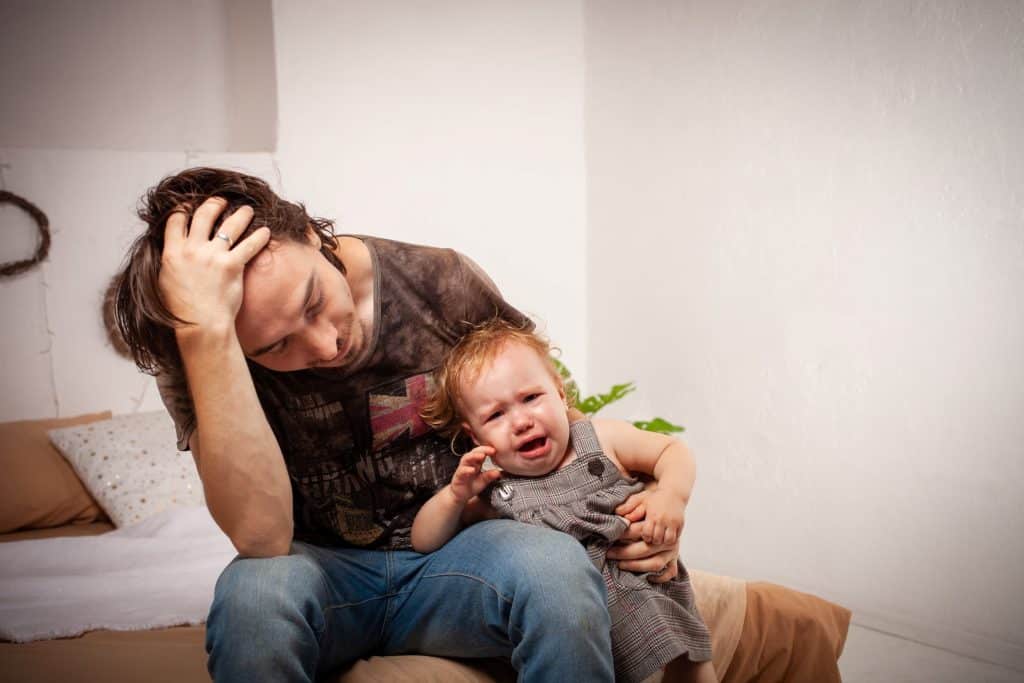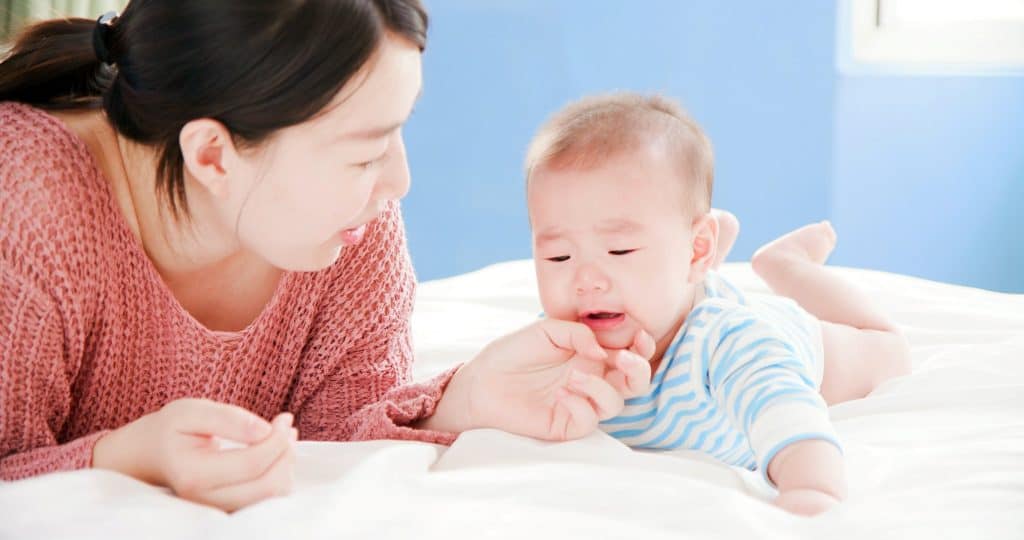Frustration can get the better of well-meaning parents, and sometimes lead them to actions they regret. They can yell or otherwise lash out at their little one, then end up feeling guilty for getting angry with their baby – but by that point, it’ll be too late to take it back.
While these lapses are understandable, they should never be normalized. Guilt and shame tend to come from these mistakes, but how should parents go about processing these feelings?
It’s normal to find yourself angry at your baby, but don’t let that anger decide how to act. Learn to identify and purge frustration. Avoid situations where impulses could control you.
Babies not only notice anger, they even remember displays of it and tend to act more anxious and uncomfortable with people they see lashing out, so strive to minimize the quantity and severity of your lapses.
Feeling guilty for getting angry at your baby is an appropriate response, but don’t waste time ruminating if you don’t plan on taking accountability for your mistakes.
Is It Normal to Get Angry at Babies?

Yes, it’s normal to get angry at babies. Just don’t act while you’re angry and you’ll be fine.
Babies are warm and lovable bundles of joy, but few things can grate on a parent’s nerves more than their little one’s incessant cries! Soothing them is an exhausting ordeal at the best of times, and you’ll likely be running through half a dozen solutions until they finally settle down.
Imagine you were a waiter handling a customer, except the customer didn’t speak so much as yell. That customer also isn’t paying you, and will actively cut into not only your responsibilities but even your sleep schedule. A bit of crankiness is to be expected dealing with difficult babies.
Anger and frustration are fair emotions to feel, but avoid making critical decisions during this time. Your judgment is clouded, and you may be tempted to act impulsively to sate your frustration. Take a breath and separate yourself from these risky situations.
What To Do When You Get Angry At Your Baby?
Tip 1: Calm Yourself Down
Prioritize winding down if you find yourself on the brink of yelling at your infant. Options for this include breathing exercises, taking a drink of water, or music – do these for cases where your baby needs to be taken care of immediately (i.e. soiled diapers, booboos).
After their needs are settled, take the time to purge your frustrated feelings. Take a power nap, indulge in a hobby of choice, watch a movie, or even cuddle up to your partner for a recharge. It’s important to cope with your struggles before they boil over.
While it may be tempting to cuddle up with your child, we’d recommend creating some space for the moment. They were your stressor in this instance, so don’t place them in a situation where they could set you off – even if that doesn’t feel likely to happen, don’t take the risk.
Place them somewhere safe in the interim, and have them supervised by other people in your household. It’s okay to take a moment to get your bearings here. There’s no shame in feeling overwhelmed while dealing with your baby.
Resist the urge to vent these frustrations toward your little one. It might feel cathartic for the moment, but once that passes you’ll be left wracked with mom guilt for getting frustrated.
Tip 2: Mind The Triggers
General frustration is a normal part of a parent’s life, but this extreme response likely came from something specific. Identifying that trigger is key, as awareness is your best preventative measure.
What exactly did your baby do that got you yelling? Was it something they did? Was it when they did it? Or was it something else entirely?
A baby’s cries never come conveniently, and for working parents, such disruptions throttle their very limited leisure time. That’s just one example of a trigger than needs to be considered.
It’s normal to feel guilty about getting angry at your baby, but a responsible parent shouldn’t stop at tolerance or self-disgust. Focus on understanding the series of events that led to that point, then figure out how to best avoid, combat, and control these triggers to the best of your ability.
Tip 3: Ask Others For Help
While all parents need to be caregivers, not all caregivers need to be parents! It does take a village to raise a child…
Family and trusted friends may be just the helping hands you need to properly care for your infant. They could alleviate the worst of your struggles by tending to your infant when you’re unable to and providing crucial emotional support as confidants in your life.
You aren’t alone in caring for your child, and this even applies to single parents. There’s bound to be someone nearby willing to help make your life a little bit easier. Don’t let pride or obligation get in the way of that, and accept the support you and your baby deserve with open arms.
Never forget that you aren’t any less of a parent for needing help from time to time.
Tip 4: Remember Why You’re Doing This
Despite one’s best efforts, it’s all too easy to end up viewing your baby as a burden to your emotional health – more problem than a person at this point. It’s a dangerous mindset that only ends up further exacerbating over time and mounting frustrations.
It’s important to distance yourself from your current struggles, if only for a moment. Double back and remind yourself why you do this, and why you love your baby.
Spend quality time with them after the angry episode. Spoil them with play and food and company, then allow yourself to bask in their joy.
Remember that there’s plenty to love about your baby. If you begin viewing your child solely as an obligation, it’ll be hard to care for them in the long run.
Can Your Baby Feel When You’re Angry?

Infants as young as one-month-old can and will pick up on emotions displayed by their parents with surprising attentiveness. This exposure provided usually promotes similar moods in your child – infants learn well by example, after all.
Anger and frustration could introduce emotional duress and insecurity in your baby if left unchecked. This is more likely to happen if the majority of their exposure is either negative or anxiety-inducing.
At a minimum, these displays will impair your baby’s short-term moods and social interactions.
While you can’t account for every negative display, you can offset these lapses by exposing your infant to positive traits and interactions. Don’t ever let frustration define your baby’s upbringing, as they will inevitably follow the unhealthy precedent you set before them.
Do Babies Remember When You Get Angry?

Babies not only remember when you get angry but even alter their behavior to avoid it! Early on in their development, this usually comes in the form of appeasement. Yes, babies learn how to deal with people (to a small extent) even before learning how to speak!
Research by Repacholi et. al. (2016) highlighted just how appeasement functioned for infants handling angry adult subjects.
In their study, infants witnessed two adults interacting with one another. These interactions differed across test groups – one test group had one adult act in an angry manner, while the other test group had the same adult act calmly during the conversation.
After this, the babies were then given toys of their choosing. The adult they saw acting was then placed in the same room as the child, requesting to borrow the toy they were playing with. The adult in question asked this calmly for all children, with the only difference being prior exposure.
The results showed that infants who’d witnessed the “angry” display were more likely to part with their toys than infants who’d seen the tame interaction.
The researchers interpreted that babies did this to placate the adult. Even if the adult wasn’t angry with them at the moment, the fact that they’d witnessed the aggressive interaction altered their behavior to become more conciliatory in an effort to avoid provoking the adult into anger.
The key takeaway here: Babies remember when you get angry, and they’ll put the effort into avoiding that response. They’re trying their best to get along with you, even this early on!
Crying is how they communicate – one of the few effective means at their disposal. They’re not doing it for the sake of being annoying or difficult.
Keep that in mind when you feel the urge to lash out against your little one in frustration.
What To Do About the Guilt?

Feeling guilty over getting angry at a baby is a common emotional state for frustrated parents. It also feels awful and overwhelming, but don’t wallow in this shame. Having a lapse in temperament doesn’t mean that you failed as a parent.
Instead, use it to encourage positive change. View your lapse as a learning experience, and treat the problem with the urgency it warrants.
Yelling at your child doesn’t make you a bad parent – refusing to take responsibility for it does. Pretending it’s not a problem is just as bad, and you’ll be stuck with intrusive mom guilt for getting frustrated without recognizing that frustrations are part of this process.
Use this guilt to form your foundation for improvement, but don’t define yourself by this mistake. Strive to be better for both yourself and your child, and they will 100% feel that effort.
Final Thoughts
Frustration and anger are valid emotions to feel when handling difficult infants. Don’t let yourself wallow in guilt. Focus on inspiring positive change and setting the best example you can. Feeling guilty for getting angry at your baby means that you have the self-awareness to recognize your problems – improving on them will take a lot of time, kindness, and patience.